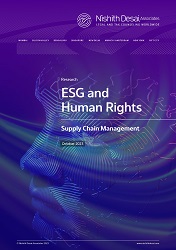ESG and Human RightsSupply Chain ManagementOctober 30, 2023
Chambers and Partners Asia Pacific 2023: Top Tier for Tax, TMT, Employment, Life Sciences, Dispute Resolution, FinTech Legal Legal 500 Asia Pacific 2023: Top Tier for Tax, TMT, Labour & Employment, Life Sciences & Healthcare, Dispute Resolution Benchmark Litigation Asia Pacific 2023: Top Tier for Tax, Labour & Employment, International Arbitration AsiaLaw Asia-Pacific 2023: Top Tier for Tax, TMT, Investment Funds, Private Equity, Labour and Employment, Dispute Resolution, Regulatory, Pharma IFLR1000 2023: Top Tier for M&A and Private Equity FT Innovative Lawyers Asia Pacific 2019 Awards: NDA ranked 2nd in the Most Innovative Law Firm category (Asia-Pacific Headquartered) RSG-Financial Times: India’s Most Innovative Law Firm 2019, 2017, 2016, 2015, 2014 DisclaimerThe contents of this Publication should not be construed as legal opinion. View detailed disclaimer. |
|

The global economy has played a pivotal role in driving socio-economic progress across the world, yet it has also exposed the vulnerabilities of ordinary workers, especially in developing nations. At the core of today's global business landscape are intricate supply chains that span the globe, but the responsibilities of corporations regarding human rights within these supply chains often remain ambiguous. This research paper provides a comprehensive analysis of the intricate relationship between ESG principles and human rights within the context of global supply chains. While ESG discussions have typically focused on social issues like diversity, equality, and inclusion, it is imperative to consider other human rights violations within these supply chains, including child labor, forced labor and hazardous working conditions. The paper sheds light on the profound repercussions of inadequate supply chain management on human rights, including financial costs, damage to reputation, business disruptions and legal consequences. It highlights the crucial role that corporations play in addressing modern slavery practices within their supply chains. Examining the legal and regulatory landscape at both international and domestic levels, the paper highlights the interconnections of these elements and their potential to proactively prevent human rights abuses. In a world increasingly shifting toward a stakeholder-centric approach, this paper highlights the growing importance of ESG principles and human rights in supply chain management. It calls for collaborative efforts among governments, businesses and non-governmental organizations to combat and prevent human rights violations in complex global supply chains, fostering sustainable, long-term success in an ever-evolving global landscape. Please click here to access our paper. Warm regards, - Faiza Khanum and Rahul Rishi
For any help or assistance, please email us on concierge@nishithdesai.com. Do visit us at www.nishithdesai.com.
|
Disclaimer
The contents of this hotline should not be construed as legal opinion. View detailed disclaimer.
Research Papers
Compendium of Research Papers
Clinical Trials and Biomedical Research
in India
Cybersecurity Law and Policy
|
NDA Hotline |




